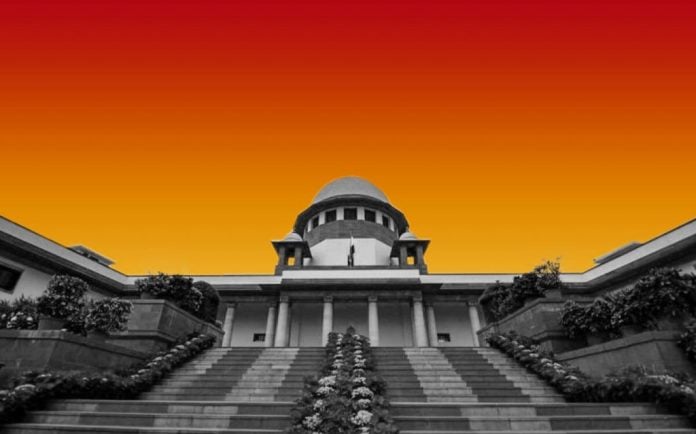The Supreme Court on Monday directed National Conference leader Mohammad Akbar Lone, the lead petitioner in a batch of petitions challenging the abrogation of Article 370, to file an affidavit affirming that he unconditionally accepted that J&K was an integral part of India and that he owed allegiance to the Constitution of India.
On the 14th day of hearing, the Constitution Bench of Chief Justice of India D.Y. Chandrachud, Justice S.K. Kaul, Justice Sanjiv Khanna, Justice B.R. Gavai and Justice Surya Kant resumed hearing on a bunch of pleas insisting to revoke the special status granted to the erstwhile state of Jammu and Kashmir by Article 370.
The Apex Court further took note of a petition filed before it today by a Kashmiri Pandit organisation, Roots in Kashmir, objecting to Lone’s credentials for coming before the Supreme Court against a constitutional challenge such as this.
The petition apprised the Apex Court about the pro-Pakistan slogans raised in the Jammu and Kashmir Legislative Assembly by National Conference leader Mohammad Akbar Lone.
At this juncture, Solicitor General Tushar Mehta, appearing for the Union of India, contended that the ‘lead petitioner’ in this batch of petitions saying “Pakistan Zindabad” on the Floor of the House in Jammu and Kashmir had its own seriousness.
He further said that the NC leader neither apologised for the incident, nor has any remorse for the same.
SG Mehta requested the Constitution Bench, which has been hearing the matter since July 11, to ask Lone to state on an affidavit if he accepted India’s total sovereignty and denounced terrorist and separatist acts in J&K.
The Constitution Bench led by the CJI then said that the response of Lone would be sought during the rejoinder submissions.
The Apex Court said that it had read about the incident in several newspapers and assured the Central government that it would hear them on this point.
As per SG, allowing such a person to do nothing even after Lone’s openly pro-Pak stance has come to light before the highest court would encourage other secessionists and terrorist activities.
The law officer said despite this being brought to the court’s attention, if he does nothing, it might encourage others. This could affect the efforts of the nation to bring in normalcy, which have been substantially successful so far. He further said that such statements coming from responsible leaders had their own context and seriousness.
The petition filed by Managing Trustee of Roots in Kashmir, Amit Raina, alleged that Lone has been ‘openly’ raising pro-Pakistan and India-hating slogans.
It further said that Lone shouted slogans like ‘Pakistan Zindabad’ on the Floor of the J&K Assembly, while he was a member of the State Legislative Assembly during 2002 to 2018.
As per the affidavit, Lone himself not only admitted shouting the slogan, but refused to tender an apology when asked for by the journalists.
The affidavit filed by the Kashmiri Pandit organisation has pointed out that Lone, while addressing the media, hesitated to identify himself as an Indian, when journalists sought answers from him for his pro-Pak sentiments and slogans in the J&K Assembly.
Today, the senior law officer told the Supreme Court that as lead petitioner, Lone must speak up against terrorism and separatist & secessionist thought on record.
“Akbar Lone must say that he opposes and objects against terrorism and any secessionist activities by Pakistan in Jammu and Kashmir or elsewhere…It must come on record..”
– SG Tushar Mehta said
The Court is currently on day 14 of hearing the pleas challenging Article 370’s abrogation on August 5, 2019 by the Central Government vide a Presidential Order which revoked the “special status” of Jammu & Kashmir.
The President issued The Constitution (Application to Jammu And Kashmir) Order, 2019 CO 272 replacing the words ‘Constituent Assembly’ from Article 370(3) with ‘Legislative Assembly [of Jammu & Kashmir]’.
A Statutory Resolution was introduced by Home Minister Amit Shah in the Rajya Sabha which abrogated Article 370 as the state of under president’s rule. Finally, on the next day, the Parliament passed the Jammu and Kashmir Reorganisation Bill, 2019 bifurcating the State into two Union Territories -Jammu & Kashmir and Ladakh.
A saga of petitions were filed challenging this move by the Centre, after which it was first taken up on August 28, 2019 by a bench led by former CJI Ranjan Gogoi, who referred the case to a five-judge bench. A five judge bench led by former CJI NV Ramana referred it to a Constitution bench on October 1, 2019.
The court is hearing the case vide the Constitution Bench of CJI DY Chandrachud, Justices SK Kaul, Sanjiv Khanna, BR Gavai and Surya Kant since July 11, 2023.
(Case Title: In Re Article 370 of the Constitution)


